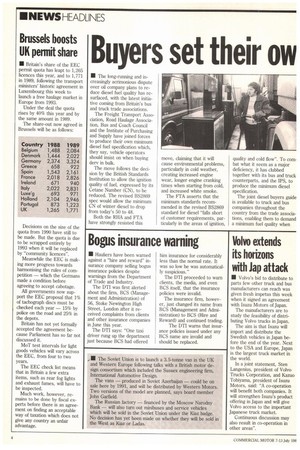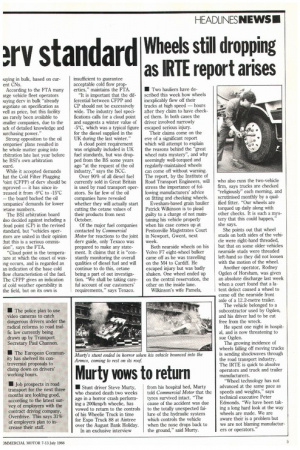Buyers set their ow rdtf standard • The long-running and
Page 4

Page 5

If you've noticed an error in this article please click here to report it so we can fix it.
increasingly acrimonious dispute over oil company plans to reduce diesel fuel quality has resurfaced, with the latest initiative coming from Britain's bus and truck trade associations.
The Freight Transport Association, Road Haulage Association, Bus and Coach Council and the Institute of Purchasing and Supply have joined forces to produce their own minimum diesel fuel specification which, they say, vehicle operators should insist on when buying dery in bulk.
The move follows the decision by the British Standards Institution to allow the ignition quality of fuel, expressed by its Cetane Number (CN), to be reduced. The revised BS2869 spec would allow the minimum CN of winter diesel to drop from today's 50 to 48.
Both the RHA and FTA have strongly resisted this move, claiming that it will cause environmental problems, particularly in cold weather, creating increased engine wear, longer engine cranking times when starting from cold, and increased white smoke.
The FTA asserts that the minimum standards recommended in the revised BS2869 standard for diesel "falls short of customer requirements, particularly in the areas of ignition,
quality and cold flow". To combat what it seem as a major deficiency, it has clubbed together with its bus and truck counterparts, and the IFS, to produce the minimum diesel specification.
The joint diesel buyers guide is available to truck and bus companies throughout the country from the trade associations, enabling them to demand a minimum fuel quality when
iuying in bulk, based on curent CNs.
According to the FTA many arge vehicle fleet operators ruying dery in bulk "already regotiate on specification as veil as price, but this facility 'as rarely been available to ;mailer companies, due to the ack of detailed knowledge and rurchasing power."
Strong opposition to the oil ompanies' plans resulted in he whole matter going into rbitration late last year before he BSI's own arbitration pond.
While it accepted demands hat the Cold Filter Plugging Joint (CFPP) of dery should be mproved — it has since in;reased it from -9°C to -15°C — the board backed the oil :ompanies' demands for lower :etane numbers.
The BSI arbitration board also decided against including a :loud point (CP) in the revised Aandard, but "vehicles operators are united in their opinion that this is a serious OMMiS3ion", says the FTA.
"Cloud point is the temperature at which the onset of waxrig occurs, and is regarded as an indication of the base cold flow characteristion of the fuel. The CFPP gives an indication of cold weather operability in the field, but on its own is insufficient to guarantee acceptable cold flow properties," maintains the FM.
"It is important that the differential between CFPP and CP should not be excessively wide. The industry fuel specifications calls for a cloud point and suggests a winter value of -5°C, which was a typical figure for the diesel supplied in the UK during the last winter."
A cloud point requirement was originally included in UK fuel standards, but was dropped from the BS some years ago "at the request of the oil industry," says the BCC.
Over 90% of all diesel fuel currently sold in Great Britain is used by road transport operators. So far few of the oil companies have revealed whether they will actually start cutting the cetane values of their products from next October.
Of the major fuel companies contacted by Commercial Motor for reactions to the joint dery guide, only Texaco was prepared to make any statement. It claims that it is "constantly monitoring the overall qualities of diesel fuel and will continue to do this, cetane being a part of out investigation. "We shall be taking careful account of our customers' requirements," says Texaco.


















































